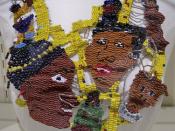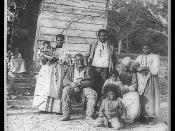American music has been highly influenced by the descendants of African slaves, whom were brought to America in the early seventeenth century. The first evidence of their cultural contribution was the musical customs brought by the slaves, in their instruments and natural vocal talent. The slaves' unrelenting life style and religious instruction led to the musical birth of Spiritual songs. Gospel appeared reformations of black churches; then the music industry grew into the colorful genres of Blues and Jazz. It is clear that American music, leading up to today's Rap and Hip-Hop contains many roots and origins from African music.
The musical diffusion between Africa and America began with the slave trade. Coming from all parts of western Africa, by way of the Middle Passage, African peoples were shipped to the United States and sold into slavery as early as 1619. With nothing but labor usages intended for them, they were not allowed to bring musical instruments.
However, with much knowledge of these familiar instruments, slaves were able to construct new ones; by hollowing out reeds and logs and with the use of gourds they fashioned fiddles, banjos, rattles, and different sized drums. The drum, representing the heartbeat, had a great deal of importance and was often considered sacred. The Ashanti people of Ghana believed the man on the moon was a drummer. The drum was also used for communication. By piecing together different combinations of rhythms and pitches slaves could send various messages throughout dwellings. Slaves often used their musical gifts in entertainment and holiday gatherings. Exceedingly talented slaves were favored among others. These slaves received special privileges such as the owners' permission to make a profit using their talent or a recess from physical labor in order to entertain the owner or a guest. A widely recognized...


